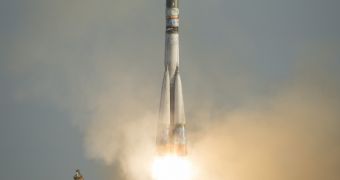The Soyuz TMA-11M space capsule carrying three members of Expedition 38 to the International Space Station (ISS) successfully blasted into space earlier today, at 10:14 am Kazakh time (04:11 GMT), from the Baikonur Cosmodrome, in Kazakhstan.
The spacecraft carries Russian, American and Japanese astronauts that will make up half of Expedition 28. Commanding the flight is the Russian Federal Space Agency's (Roscosmos) Mikhail Tyurin. NASA astronaut Rick Mastracchio and Japan Aerospace Exploration Agency (JAXA) astronauts Koichi Wakata are flight engineers for the mission.
Soyuz TMA-11M rose in the morning sky aboard a Soyuz-FG rocket, from Baikonur's launch pad 1/5. The launch was broadcast live by NASA, and the feed was shown on New York City's iconic Toshiba Vision high-definition LED display, in Times Square.
The spacecraft carries a very special cargo, the Olympic Torch that will be used to mark the beginning of the 2014 Winter Olympic Games, to be held next year in Sochi, Russia. On November 9, the Torch will be taken outside the ISS during an extra-vehicular activity (EVA).
The capsule is scheduled to dock with the orbital facility some 6 hours after its launch. NASA experts say that the Soyuz capsule should be safely secured to a port on the Russian-built Rassvet module by 10:31 GMT. Hatches between the spacecraft will open at 12:40 GMT.
Waiting for the capsule aboard the ISS are astronauts Oleg Kotov, Sergey Ryazansky and Fyodor Yurchikhin (RosCosmos), Michael S. Hopkins and Karen L. Nyberg (NASA) and Luca Parmitano of the European Space Agency.
Today marks the first time since October 2009 when 9 astronauts occupy the space lab at the same time. The crew will be reduced to the usual six members on November 10, when half of Expedition 37 (Yurchikhin, Nyberg and Parmitano) will return to Earth, aboard their Soyuz TMA-09M.
Kotov, Ryazanskiy, and Hopkins will complement the Expedition 38 crew until they return home in March of next year. The freshly departed crew is scheduled to come back to Earth in May 2014. Between March and May, Wakata will become the first JAXA ISS Commander.
In addition to its crew, the Soyuz TMA-11M also carries food, supplies, space parts, scientific experiments and personal items for astronauts aboard the space station.

 14 DAY TRIAL //
14 DAY TRIAL //